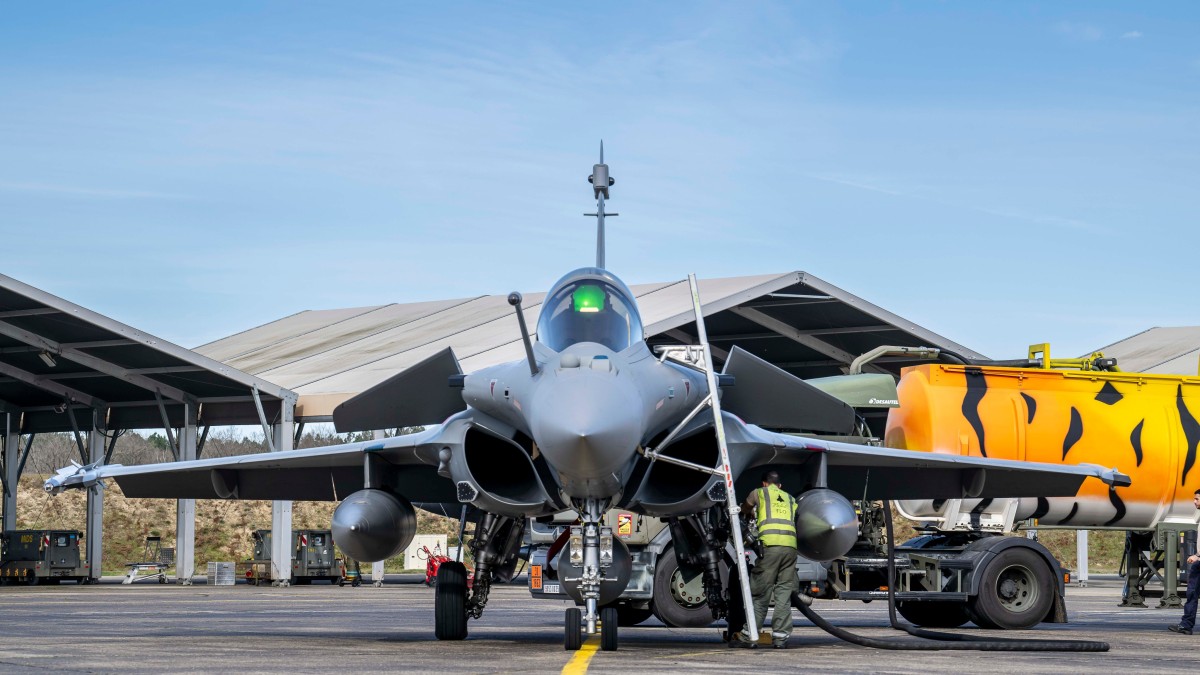The Rafale F4.1 standard – the initial stage of a three-part enhancement process that started with the F3R standard – is aimed to augment the fighter aircraft’s capabilities by the end of this decade. The upgrade will enable the aircraft to counter the challenges of today’s warfare.
Russia ‘Opts Out’ Of BrahMos But India Commitment To Acquire Supersonic Cruise Missiles; Here’s Why
The French Air and Space Force has announced that the Rafale F4.1 fighter aircraft has completed its first alert sorties, proving its operational readiness.
This milestone comes a year after the first F4.1 standard Rafale was delivered to the ECE 1/30 “Côte d’Argent” stationed on BA 118.
The service said that on February 16, the Rafale F4.1, stationed with the 30th fighter wing, undertook the first alert sorties aimed at enhancing the training and preparedness of the wing.
The announcement was made via the official X (formerly the Twitter) page of the French Air and Space Force.
“1 year after its delivery to the ECE 1/30 “Côte d’Argent” located on BA 118, the Rafale F4.1 carried out first alert sorties for the benefit of the training of the 30th fighter wing on 02/16. This alert demonstrates that the fighter’s F4.1 is ready,” the French Air Force said in a tweet on February 25.
1 an après sa livraison à l’ECE 1/30 « Côte d’Argent » situé sur la BA 118, le Rafale F4.1 a effectué une 1re sortie d’alerte au profit de l’entraînement de la 30e escadre de chasse le 16/02. Cette prise d’alerte démontre que le F4.1 du chasseur est prêt.@Armees_Gouv pic.twitter.com/Y2v9TqQ5IX
— Armée de l'Air et de l'Espace (@Armee_de_lair) February 25, 2024
The Rafale F4.1 standard is the initial stage of a three-part enhancement process intended to augment the aircraft’s capabilities by the end of this decade.
The announcement marks a key achievement for the French Air Force in its efforts to deploy the upgraded Rafale F4 fighter aircraft to address the challenges of the modern battlefield.
The groundwork for the F4 standard was laid in 2019, when the then-Armed Forces Minister Florence Parly secured a landmark €2 billion ($2.12 billion) contract with Dassault, the manufacturer, setting the stage for the aircraft’s evolution.
Flight testing for the F4 standard commenced in April 2021 under the oversight of France’s DGA, with the aircraft anticipated to achieve full operational readiness by 2025.
In March 2023, the Air Warfare Center of the service, situated at the 118th air base in southwestern France, received the first Rafale in the F4.1 standard, marking a milestone in the development process.
Originally delivered under the F3R standard beginning in early 2023 to the French military procurement office, Direction Générale de l’Armement (DGA), the aircraft underwent a crucial “software transformation” at the DGA’s flight test center in Istres, near Marseille, to transition to the advanced F4 standard.
Upgraded Rafale F4 Fighter Aircraft
The Rafale F4.1, the latest iteration of the fighter jet, represents a significant leap forward in enhancing its interoperability with other systems. This advancement is achieved through the introduction of new intra-patrol and satellite links, communication servers, and software radio aimed at bolstering connectivity on the modern battlefield.

Notable upgrades to the Thales RBE2 radar system enable enhanced ground-moving target indication and tracking capabilities, while modifications to the infrared search and track sensor extend the aircraft’s ability for passive detection of airborne threats over longer ranges.
The F4.1-standard Rafale aircraft are equipped to carry up to three Safran Electronics & Defence 1,000kg (2,200lb) AASM “Hammer” GPS/laser-guided bombs, significantly expanding its ground attack capabilities.
The integration of the Thales Talios laser designation pod, featuring a “permanent vision” mode for sustained target tracking in adverse weather conditions, is facilitated by optical fibers transmitting high-definition imagery from the sensor to the cockpit, which now boasts two new digital displays for enhanced situational awareness and operational effectiveness.
Enhancements extend to the pilot’s interface with the adoption of an upgraded Thales Scorpion helmet-mounted display, providing intuitive access to critical data and described by the company as a “game-changer” in aerial combat operations.
Cyber-protection measures have been reinforced by adopting encryption protocols, complemented by updates to the communication system to ensure secure and reliable connectivity.
Additionally, a new onboard simulation capability supports advanced training tasks, preparing pilots for the complexities of modern warfare scenarios.
Further advancements are anticipated through the F4.2 and F4.3 updates, including the integration of Thales software-defined radio and satellite communications systems. Qualification activities for these forthcoming standards are slated for completion in early 2025 and early 2027, respectively.
The latest variant of Rafale is also positioned as a transitional platform, strategically poised to bridge capabilities with France’s next-generation fighter, developed in collaboration with Germany and Spain under the trinational Future Combat Air System (FCAS) program, projected to enter service around 2040.
- Contact the author at ashishmichel(at)gmail.com
- Follow EurAsian Times on Google News